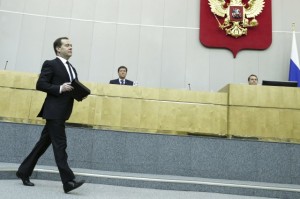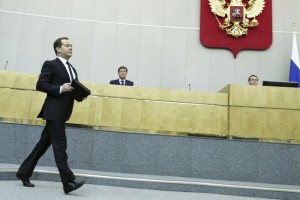Russian economy shrank by 2%
The Russian economy shrank by 2% in the last quarter admitted Prime Minister Dmitry Medvedev, who presented in the Government the annual activity report of the Cabinet. He blames the unprecedented challenges of the collapse in oil prices and sanctions imposed because of the crisis in Ukraine. The decrease was biggest at the end of […]

 The Russian economy shrank by 2% in the last quarter admitted Prime Minister Dmitry Medvedev, who presented in the Government the annual activity report of the Cabinet. He blames the unprecedented challenges of the collapse in oil prices and sanctions imposed because of the crisis in Ukraine. The decrease was biggest at the end of 2014 and beginning of this year, but now the situation stabilized, sighted Medvedev in the lower house of parliament in Moscow. The decline in gross domestic product happened for the first time after the contraction in 2009.
The Russian economy shrank by 2% in the last quarter admitted Prime Minister Dmitry Medvedev, who presented in the Government the annual activity report of the Cabinet. He blames the unprecedented challenges of the collapse in oil prices and sanctions imposed because of the crisis in Ukraine. The decrease was biggest at the end of 2014 and beginning of this year, but now the situation stabilized, sighted Medvedev in the lower house of parliament in Moscow. The decline in gross domestic product happened for the first time after the contraction in 2009.
“There should be no illusions. Today we are not facing only a short-term effects from crisis. Russia has never faced the challenges of today. For the first time in the history of Russia after the collapse of the USSR, and partly even in the history of Russia in the 20th century, during the Soviet and post-Soviet period, the country was subjected to two external shocks at once – the sharp fall in prices oil and solid unprecedented sanctions pressure”, said Medvedev.
According to Medvedev sanctions have caused the Russian housekeeper damage of around 25 billion EUR in 2014, this amount may increase several times this year. In the history of the Soviet Union and Russia there were “about 10 penalty waves”, and periods of very low oil price – in 1998 as the price was 9 USD per barrel, reminded Medvedev.
This fall, in his words, is fully comparable to today, taking into account the change in the purchasing power of the dollar and the ruble to date, the average salary in Russia and other factors. According to Prime Minister, however, Soviet and Russian history has not yet happened, as now, the negative “factors act simultaneously strengthening their mutual influence”.
The economy of the largest energy exporter in the world enters a recession after almost 50% collapse of oil prices and the worst crisis of the ruble since 1998. The sanctions adopted by the United States and the European Union on the conflict in Ukraine, difficult access to international financial markets and encouraged the export of capital. Even in the current fragile ceasefire in Ukraine and the stabilization of oil prices the central bank predicts the economy will shrink by 4% this year.
“In the history of every country there are times that of the era of another era; exactly this happened in 2014 to today’s Russia”, said Medvedev. Prime Minister meaningfully compare this event to the fall of the Berlin Wall and the reunification of Germany.









